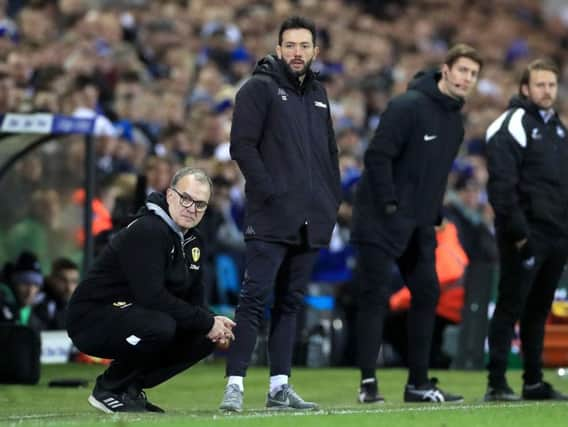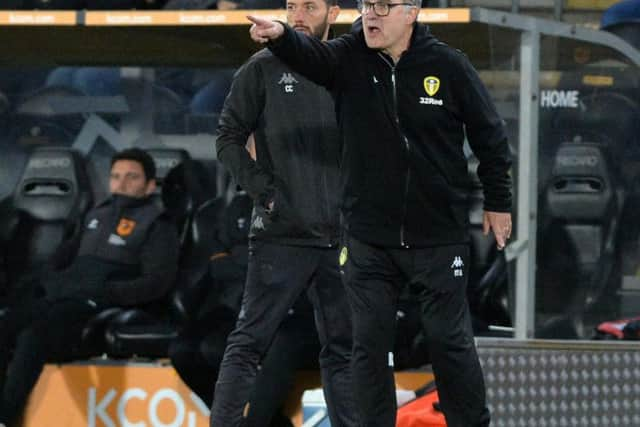Living the dream with Leeds United and Marcelo Bielsa: read the YEP's big interview with Carlos Corberan


Travel is part of life in his industry but a willingness to go wherever, whenever has given Corberan an education. He holds an eclectic CV: six years with Villarreal and three as assistant manager, a stint in Saudi Arabia as number two to Raul Caneda – a confidant of Pep Guardiola’s – a brief crossing of paths with Fabio Cannavaro, a head coach’s job in Cyprus and now, in England, a place in Marcelo Bielsa’s iron circle. “I wasn’t scared about which country I moved to for work,” Corberan says. “My only focus was developing my footballing ideas and trying to be a better coach.”
Corberan is 35 but has been fashioning a career in coaching for 12 years. He grew up in Valencia and joined their academy as a goalkeeper but never played higher than Spain’s third division and was never delusional about his ability. “I finished my career pretty fast,” he says, “and I was 23 when I started to feel like my future would be more in coaching than as a player.” So he took a degree in sports science and began applying for coaching badges. He and Marcos Abad, Leeds’ goalkeeping coach, are from the same breed: no major playing careers to speak of but UEFA Pro qualified and employed at a high level. Bielsa, a defender who retired in his 20s, could relate to that.
Advertisement
Hide AdAdvertisement
Hide AdVillarreal, when Corberan was first given a contract there in 2006, were embracing the monumental shift in Spanish and European football caused by Guardiola; in and out of the Champions League and the UEFA Cup with Manuel Pellegrini on the touchline. “In one period in Spain, Guardiola started a revolution,” Corberan says. “The Spanish national team started to change their model of play because Spain came from a long period where they didn’t try to control games.


“From this moment there was a link between Guardiola and the Spanish national team and the style of Villarreal was in the same direction. It gave me new ideas about how you can train teams and what the best methodology is to have one style of play. It’s something that goes inside of you. It changes your mind and changes your feelings towards football.”
Guardiola’s football in certain respects was an extension or a hybrid of Biesla’s, much as Bielsa dislikes the idea that he had any influence on Guardiola’s genius. Corberan says Villarreal gave him the bug for “trying to control games with the ball, trying to keep the ball all the time, trying to dominate” and Bielsa’s philosophy at a very basic level is exactly that. Corberan was new to England but not to the ethos which now dominates Thorp Arch.
It was different when Leeds contacted him in 2017 to ask if he would be interested in managing their Under-23s. The club were in between managers after losing Garry Monk and their development squad was down on numbers, to the point of having 11 young professionals and no spine. Earlier this week, the Under-23s won their Professional Development League with two games to spare. In the season before Corberan’s appointment, they finished seven points adrift at the bottom of it. Corberan was not a silver bullet but he – and Leeds – has revived that squad in the space of two years.
Advertisement
Hide AdAdvertisement
Hide AdHe was recommended to Leeds by a colleague who had worked with him at Villarreal but relocated to Aspire, the ultra-expensive academy in Qatar which United formed a partnership with last season but speak less about these days. “I didn’t have any doubt about (the job) because I knew the project,” Corberan says. “I knew which people would come here.
“I knew Ivan Bravo (the Leeds board member who ran Aspire) and he’s someone with high experience. Victor Orta was the same. We didn’t work together before I arrived here but I knew about the experience he had in Spain. And when you’re young, when you love football, England is special. To have the possibility to come to England but at the same time work with people who you think have high value, especially at Leeds United, all the conditions were perfect.”
Orta, United’s director of football, recruited busily in Corberan’s first summer, building up the head-count at Under-23 level with academy signings, the vast majority from continental Europe. Corberan and the academy took the decision that, in order to develop the players with most potential, they would use some out of position, take risks with their line-ups and suck up some poor results. In the first half of Corberan’s first season, they won three games.
“When I arrived, the important thing was to create a model of how we wanted to play,” Corberan says. “The first part wasn’t about putting players in just because you needed players to play.
Advertisement
Hide AdAdvertisement
Hide Ad“For example, we made decisions to play without a clear left-back or without clear centre-backs. The idea was about which players had the potential to continue in this club and grow. Our priority was not results because, if our objective was results, maybe we would take bad decisions. You’d play players without futures here just because you need to get results. The idea was to know which players deserved to be here. Sometimes you have to stop your ego because of course, as coaches, we want to win games. But I understand that my project here is more medium-term.”
Leeds’ academy has always been a collective mission. These days it has almost 30 full-time staff and more than 100 in total. Orta’s better signings made a difference, Corberan’s coaching has worked (in the past eight months, Leeds’ Under-23s have lost all of eight matches) but some who have come through the academy – Jamie Shackleton, Jack Clarke, Robbie Gotts, Bailey Peacock-Farrell – were here long before either of them. The Under-23s were lacking any impetus when Corberan came in but the academy was not in disarray. “This club have always developed their academy and put players in the first team,” Corberan says. “It’s not true if I tell you that I came to a club which wasn’t working.”
Last summer, Leeds opened themselves up to a bigger revolution. Bielsa flew in from Argentina and laid out, in the finest of detail, how Thorp Arch would operate on his watch. Corberan knew of Bielsa – “when you’re a coach you try to know what the key coaches in the world are doing” – but did not know him personally and the appointment was followed by the recruitment a backroom team of regular Bielsa lieutenants. Before long, Corberan was invited into it: a go-between who would contribute with the first team but continue to manage the Under-23s, alongside a second academy coach, Danny Schofield.
Bielsa wanted the Under-23s to train as his senior squad did and play as his senior squad did, with many of the better prospects working with him directly. Corberan was tasked with facilitating the crossover, to very good effect. The development side, in Bielsa’s image, have run their division ragged. Bielsa has felt confident enough in them to give first-team debuts to no fewer than seven graduates.
Advertisement
Hide AdAdvertisement
Hide Ad“In the Under-23s we work like one part of the first team,” Corberan says. “One of my functions is to lead the process of the training with the Under-23s and to lead their games. This connection is key because both teams are working with the same idea, the same philosophy and with as close a methodology as we can.
“When I was at Villarreal, we played versus Marcelo when he was at Athletic Bilbao. I remember when he came to Spain, it was the same – a surprise and everyone wanted to know how he was working. But I think you can’t really know until you are working with him. Then all your ideas change.
“Until I started working with him, I only knew the opinion of the other coaches but I couldn’t feel it. Now I think that all the coaches who talk about Marcelo being one of the best coaches in the world, I totally agree with them.
“He’s someone who likes to control all the details. To be a coach, it’s one profession which is never going to stop, which is never finished. He tries to control the game and this is brilliant because I have the same idea, the same passion.”
Advertisement
Hide AdAdvertisement
Hide AdLeeds have never spoken publicly about a succession plan for Bielsa, and no-one would seek to second-guess his longevity or his intentions, but Corberan is the one coach who will be left behind when Bielsa leaves. The others come and go with the Argentinian, a package around him, and Bielsa does not tend to stick in one place for too long. It might be that Corberan, on the strength of his impact with the academy and his education under Bielsa, presents an option for continuity when the time comes.
“My ambition when I arrived here was to help in the role I had,” Corberan says. “Last year, I was only focused on the Under-23s, to create a base and develop a style of play. This year, they moved me to be part of Marcelo’s staff and my only focus is to be helping him with the things he delegates to me.
“My only focus is to go year by year or step by step. This is enough ambition right now, not to think about other things which might be.”